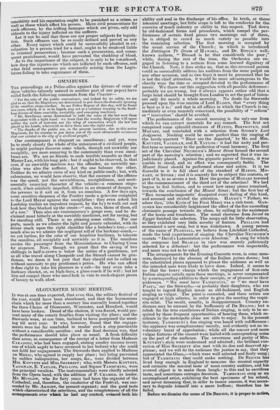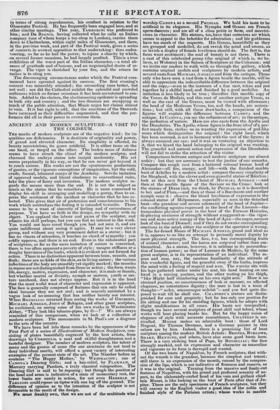GLOUCESTER MUSIC MEETING.
IT was at one time expected, that even this, the solitary festival of the year, would have been abandoned, and that the harmonious chain which for more than a century has annually bound together the three Choirs of Gloucester, Worcester, and Hereford, would have been broken. Dread of the cholera, it was feared, would pre- vent many of the county families from visiting the place; and the Stewards were, at one time, inclined to have postponed the meet- ing till next year. It was, however, found that the engage- ments were too far concluded to render such a step practicable without a considerable sacrifice ; and the final decision was, that the performance should take place as usual. A fresh difficulty then arose, in consequence of the receipt of a letter from Madame CARADORI, who had been engaged, stating sundry reasons (every one of which ought to have occurred to her before) why she could not fulfil her engagement. The Stewards then applied to Madame DE MERIC, who agreed to supply her place; but being prevented by sudden indisposition, her songs, &c., were divided between Mrs. KNYVETT and Miss SHIRREFF; who, with Messrs. KNYVETT, VAUGHAN, E. TAYLOR, PHILLIPS, and Signor TAMBURINI, were the principal vocalists. The instrumentalists were chiefly selected from the Opera band, with the addition of F. CRAMER, as leader. Mr. MUTLOW, who for forty years had been the organist of the Cathedral, and, therefore, the conductor of the Festival, was suc- ceeded by Mr. Almon; the present organist; and the good taste which characterized the selections, and the completeness of all the armegements over whisk he had any control, evaseed.both Ins ability and zeal in the discharge of his office. In truth, at these triennial meetings, but little scope is left to the conductor for the exercise of much industry or ability in this respect. Tied down by old-fashioned forms and precedents, which compel the per- formance of certain fixed pieces two mornings out of three, he is obliged to crowd as much variety as possible into the remaining selection. The first morning is occupied by the usual service of the Church ; in which is introduced the Dettingen Te Dam of HANDEL, and Dr. BOYCE'S well- known anthem, " Blessed is he that considereth the poor ;" while, during the rest of the time, the Orchestra are en- gaged in listening to a sermon from some learned dignitary of the Church. Now, it does strike us, that as this reverend person could as successfully address his auditors from the same pulpit on any other occasion, and as (we fear) it must be presumed that he is not the chief attraction, it would be more advantageous to the charity were the time so occupied devoted to the performance of music. We throw out this suggestion with all possible deference: probably we are wrong, but it always appears rather odd that a. large band should be brought from London to act the part of listen- ers only for nearly a whole morning. No doubt the Stewards proceed upon the wise maxim of Lord ELDON, that "every thing is best as it is ;" and that in all affairs in which the Church is im- mediately or even remotely concerned, the possibility of " reform" or " innovation" should be avoided.
The performance of the second morning is the only one from which we can extract materials for any remark. The first act comprised some splendid choruses of HAYDN, BEETHOVEN, and MOZART, and concluded with a selection from SPOHR'S Last Judgment. Nothing could be more perfect than the singing of the lovely quartett " Blest are the departed," by Mr. and Mrs. KNYVETT, VAUGHAN, and E. TAYLOR : it bad the unity and per- fect tune so necessary to the perfection of vocal harmony. The first act of the Chevalier NEUKOMM'S Mount Sinai formed the second part of the morning's selection ; and we regretted that it was in- judiciously placed. Against the gigantic power of SPOHR, it was unable to stand, and its effect was consequently feeble. The Mount Sinai should be performed alone and entire. It is no discredit to it to fall short of the standard of HAYDN, MO-• zsar, or SPOHR; and it is scarcely fair to subject this oratorio, or part of it, to so severe a test. How the genius of MOZART towered at the commencement of the third act of the selection! We had begun to feel listless, and to count how many pieces remained, towards the conclusion of the Mount Sinai; but the first bar of "Rex tremendm majestatis" dissipated every feeling of this kind, and aroused and riveted the attention. HAYDN'S " Father, we adore thee," (the Kyrie of his First Mass) was a rich treat. GAR.. DINER has considerably heightened the effect of the fine ascending chromatic passage towards its close, by calling in the assistance of the horns and trombones. The usual choruses from Israel in Egypt finished the selection. The songs call for little observation, as they exhibited very little novelty of feature. PHILLIPS had announced a new song, but it was withdrawn. A you'e:" person of the name of PEARSALL, we believe from Litchfield Cathedral, made the bold experiment of singing the Chevalier NEUKOMM'S cantata "David's Lamentation over Absalom." A song for which the composer had BRAHAM in view was scarcely judiciously selected for a Mutant: but the performance was respectable, and more was not to be asked.
The arrangements for the Evening Concerts were, in some mea- sure, destroyed by the absence of the Italian prima donna; but the substituted pieces appeared to please the audience as well as the intended ones were likely to have done. Indeed, it seems to us that the heavy charge which the engagement of first-rate Italian singers entails upon these meetings, is never compensated by a corresponding addition to their receipts, or of pleasure to their audiences. "We must have TAMBURINI," or " we must have PASTA," say the Stewards,—or —or probably their daughters, who are taught to regard English music as old-fashioned, and English singing as vulgar. The point is conceded, and these artists are engaged at high salaries, in order to give the meeting the requi- site eclat. The result, usually, is disappointment. Country au- diences may be amused by the buffoonery of DE BEGNIS; but a relish for the true excellences of Italian singing, is only to be ac- quired by those frequent opportunities of hearing them, which re- sidents in the metropolis alone are able to enjoy. In the present. instance, TAMBURINI's fine singing was heard with indifference : the applause was complimentary merely, and evidently not an in- voluntary burst of approbation ; while all the coarser and more vulgar features of the concert were hailed with corresponding noise on the part of the audience. The sweetness and purity of Mrs. KsrvvEris style were understood and admired ; the brilliant exe- cution of Miss SHIRREFF also met with its due and deserved ap- plause; and we will do the audience the justice to say, that they appreciated the Glees,—which were well selected and finely sung; but of TAMBURINI they could make nothing. DE BEGNIS has lived long enough in England to measure the musical capacity and estimate the musical taste of most country auditors, and his avowed object is to make them laugh: to this end he sacrifices taste, and sometimes outrages decorum. TAMBURINI sung as an accomplished artist, exhibiting the best specimens of his school, and never dreaming that, in order to insure success, it was neces- sary to degrade himself into a mere buffoon; therefore has he failed.
Before. we dismiss the name of DE BEGNIS, it is proper-to notices in terms of strong reprehension, his conduct in relation to the Gloucester Festival. He has frequently been engaged here, and at other similar meetings. This year, TAMBURINI was preferred to him ; and DE BEGNIS, having collected what he calls an Italian company (one of whom keeps a toy-shop in London), carries them down to Cheltenham, within eight miles of Gloucester, and there, in the previous week, and part of the Festival week, gives a series of concerts in avowed opposition to that undertaking: thus endea- vouring, as far as he had the power, to injure a charity by which, ,on several former occasions, he had largely profited. This is a true exhibition of the worst part of the Italian character,—a total ab- sence of gratitude and of honour, and an unprincipled desire of re- venge. The viper is cherished by your fire, and the return he makes is to sting you. The discouraging circumstances under which the Festival com- menced have operated against its success. The first evening's concert was miserably attended ; the succeeding ones better, but not well : nor did the Cathedral exhibit the splendid and crowded :audiences which on former occasions it has been accustomed to con- tain. Added to the cholera, the electioneering epidemic is spreading in both city and country ; and the two diseases are occupying so mUch of the public attention, that Music urges her claims almost in vain. It is but right to add, that the exertions of the Stewards have increased as their difficulties augmented, and that the per- formers did all in their power to overcome them.



























 Previous page
Previous page